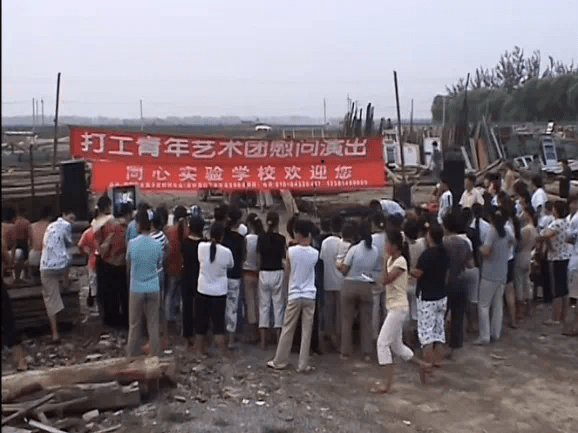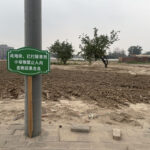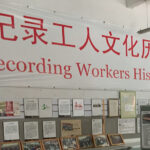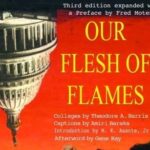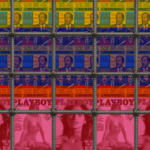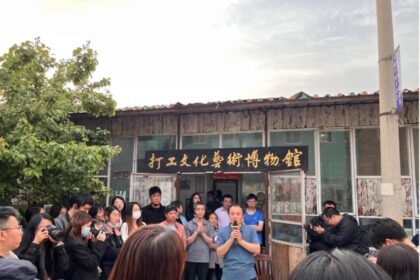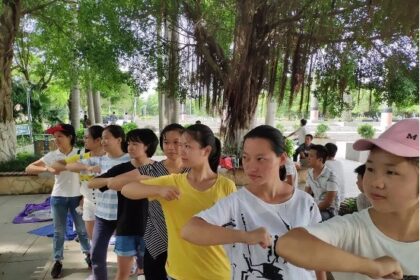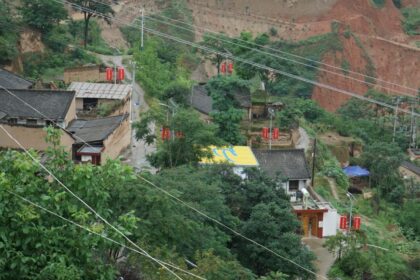The Past, Present, and Future: An Interview with Wang Dezhi
Interview by Yuxiang Dong and Yanhua Zhou
This interview took place on February 2, 2023, through the platform Tencent.
Wang Dezhi was born in 1977 in the Hinggan League, Inner Mongolia. He moved to Beijing in 1999 and took up many different jobs. He started to learn cross-talk performance during his spare time in 1999. He co-founded the New Workers Art Troupe in 2002, the Migrant Workers Home in 2003, the Tongxin Experimental School in 2005, and the first Tongxin Mutual Aid Charity Store in 2006. Between 2012 and 2014, Wang directed the Spring Festival Gala for Migrant Workers. In recent years, he also worked for the Culture and Art Museum of Migrant Workers.
Dong: Activities related to the Migrant Workers Home and Picun can be dated back to 2002 when you started the Performance Team of Young Migrant Workers (打工青年文艺演出队). Twenty years have passed, and many things happened during this period. What influenced you, the Migrant Workers Home, and Picun the most?
Wang: This question is both specific and abstract. I am personally quite undisturbed about everything now as I have been through so much. I do not think there was anything particularly special or influential for me since there have been many ups and downs. There were several key moments and turning points, such as the time we opened the school and released our first album… Since then, we started the museum, the Tongxin Peach Farm in Pinggu (平谷同心桃园), the Workers’ University (工人大学), the Spring Festival Gala for Migrant Workers (打工春晚), and the Picun Literature Group (皮村文学小组)… These things, as well as many others including some setbacks, were all crucial to us. The pandemic is perhaps the most difficult because it is a threat to our survival. In the past three years, many things were delayed and some of our team members were depressed. I hope that things can get back to normal soon so that people can regain confidence and go back to work. The charity store, in particular, needs people to work on it to sustain our lives. We have to make changes as soon as possible. For many years, we have been stuck in a poor financial situation and suffered a lot. Perhaps, this year’s priority is to deal with the financial problems
Dong: I want to know more about the Tongxin Huhui Store (同心互惠公益商店). When we first met in 2019, you mentioned Good Will, an American social enterprise. Did you try to implement a similar strategy of social enterprise to realize a kind of solidarity economy when you started the Tongxin Huhui Store? Did you also intend to reduce the dependence of financial support on foreign foundations? Or is there any other consideration?
Wang: We, including Sun Heng and others, are just a group of poor friends working together. We hope that our group of poor friends can work together to realize some dreams through a solidarity economy. It will be different from the capitalist society, but more like the so-called socialism in which property is not owned by a small group of people but is distributed to each according to contribution. We all follow an equal mechanism and live in an environment of equity. Also, we have a strong crisis awareness. One factor in considering the foreign foundations is that we also want to get rid of funding from domestic corporations and foundations. When we use the latter’s money, we need to be grateful. Although they are nice people, corporations still have their own agendas. We cannot do everything as we want and have to take a passive role. But if our financial problems can be solved, we will be able to better serve the needs of our people, which can be more proactive and meaningful. These are the two main aspects. I have to admit that business is business and has to face the market. You will earn money if you are doing well, and lose money if you are not, no matter whether you are a charity store or not.
Dong: How is the business of the store? What are the differences before and after the pandemic?
Wang: I cannot say the situation has been perfect because I have no experience in running a corporation and do not want to be an entrepreneur. Thus, the general management of the store is not very professional or systematic. I do not want to copy the mode of mainstream corporations either. It is annoying because of the market, competition, and team pressures. Running a business is different from literature, art, or organizing activities. It is a different field and very challenging for me. Therefore, we invited professionals to join and formed expert teams. During the pandemic, our primary business resource was the clothes donated by various communities including universities and enterprises, and we also held events. Nonetheless, we could not manage any of those things consistently during the pandemic and our charity store had to close. In addition, the income of our worker friends has reduced since the pandemic. They become very careful with spending money even if they really want to buy something. Generally speaking, the pandemic is a difficult time for us. But I am glad that it is over now.

Zhou: Before trying to be self-sufficient, what was your funding source in the beginning?
Wang: In the beginning, it was Oxfam from Hong Kong (a charitable organization). They supported us for quite a long time and helped us a lot. But they had to stop after the Charity Law (慈善法) took effect in 2018.
Zhou: I understand. Does that mean you considered the Tongxin Huhui Store as a means to sustain the group after 2018?
Wang: No. We started the charity store in 2006.
Zhou: Was the original purpose of the charity store related to funding?
Wang: We planned to eventually be self-funded, but we were still receiving support from foundations.
Dong: You mentioned that Xu Duo, Sun Heng, and you are a small group with a shared dream – to find a new way that is different from the current capitalist-dominated market. In your opinion, what was the original vision and goal of organizations like the Migrant Workers Home, the New Workers Band, and the Tongxin Huhui Store? What has changed over the past two decades?
Wang: I guess it is just hard to realize dreams. And the main obstacle was the problems with building our economic structure. After working on it for several years, we have now divided the whole organization into several sectors. Everyone knows their role and collaborates with each other. If one sector is productive, it can help others. This is the current mode. For example, Sun Heng is in charge of the band, and I focus on the charity store. The school mainly does community education for children, which is considered charitable and operates independently after being approved by the Bureau of Civil Affairs. The labor union has to work with the school for the Picun Literature Group, which I also need to take care of. Though we all have to keep an eye on Picun, all sectors are relatively independent and have their own focuses now. If one sector lacks resources, other sectors will provide support. Because of the pandemic, we need to control our costs so every sector can survive. I do not think there is a big change in our dream. But for many reasons, the space for us to do things is increasingly limited. Fortunately, I feel we are about to have more space now as there is a propsect for policies to adjust and release space.
Dong: In summary, can I say that the original goal was to pave a way out of the capital-driven market?
Wang: I do not think it is possible to fully get rid of the market economy today. We are just a small society in a larger society. There are several problems with a capital-driven society: the gap between the rich and the poor, benefits owned only by a small group of people, materialism, indifference among people, and moral decline. We need to try to distribute wealth equally so that people can live with dignity and trust each other. We are happy as long as we have food and a place to live a relatively comfortable life. We are not obsessed with material possessions. Luxury items such as family swimming pools, cars, or big houses are not what we strive for. We want to be organic individuals in a society of ordinary people.

Dong: Thanks. Now I also want to know your understanding of the Migrant Workers Home from an organizer’s perspective–you were a migrant worker in Beijing in the past, then established the performance team, and finally settled down in Picun to have Migrant Workers Home and other placemaking practices. During this process, your work shifted from manual labor to intellectual labor. How do you see this transition? As an organizer, how do you help members of the Migrant Workers Home understand the differences between manual labor and intellectual labor when they leave previous jobs to join you? In particular, how do you deal with the relationship between the worker fiends’ individual interests and the collective values of the Migrant Workers Home?
Wang: I think we need to be more down-to-earth rather than abstract in this discussion. I did not have any special feelings when I shifted to the managerial side. It was pretty natural. Also, I still do lots of manual work with others and I am quite good at it. Maybe I am still stronger than many younger people. We made some rules regarding working in our community. “Two participations” means that leaders need to participate in productive work and workers need to participate in management. “One reform” means that policies and regulations can be reformed if they are unreasonable. “Three-in-one Unity” refers to the combination of workers, leaders, and technicians during a technological reform. We did try to practice all these but the result was not always ideal. It was easy for leaders to participate in productive work but challenging for workers to participate in management. Most people still like to be reactive and go with the flow. This is not good. I want to change this, but it is difficult.
I never promise anything when people come here to work. The salary here is usually lower. But the good thing is that we have an equal environment, which is not as stressful as factories and companies. Another advantage is that it is a collective space here, so that people do not have to exhaust themselves as in some other working environments. This might be the most attractive thing and the reason why people did not leave us in difficult times. Our priority has always been to serve our worker friends and to advocate respect for the value of labor, which is not about being famous. As one of the founders, I am always aware that fame is just a fleeting thing. We were once famous and went viral. But now, everything has faded. In today’s society, it is reasonable for some worker friends to have the desire to get into a higher social class with non-manual labor. I will be happy for them if they move across class lines. It is ridiculous to believe that being a worker is forever since some people have the ability to have better lives. However, workers, in an abstract sense, are always the majority, while the specific working class is defined by a class line and has the mobility to cross that line. This is very common.
Dong: Why is it so difficult for workers to participate in management? You mentioned that most people just want to go with the flow. Besides this, are there any other challenges?
Wang: Perhaps, it has something to do with the human nature or the environment we have grown up in. I have always encouraged people to join and express their ideas and suggestions. But maybe the problem is that there is no specific benefit for people to do so. For example, changes or improvements are often not immediately apparent. Nonetheless, we hope that everyone can contribute value to this place. You can even lead your own team to develop the charity store into successful chain stores if you are good at managing them. The management team, including myself, wants to train more young leaders. We have different tiers in our organization, including several core members under our management team. Our worker friends may not be that ambitious or competitive in terms of running a business. Their desire is too small, or perhaps in other words, they doubt themselves too early, negating their value and potential. It is distressing when they work hard but cannot shine (with their potential). The overall situation that keeps worsening in recent years can be another reason. Our works were impacted a lot by the overall situation.
Dong: In your opinion, what can reinvigorate the desire that people have already stifled by themselves?
Wang: I tried to invigorate our economy, although I would not consider going back to capitalism. We have been passive for a long time without financial support, and everyone is not energetic. I try to encourage others when they are doing well. However, my encouragement mostly works in situations when they receive great rewards without too much effort. If it needs more effort, people will find it difficult. And it is impossible to ask every worker to be a hero or general since most people just want to follow orders. I realize that I made a mistake in these years: I was too idealistic. I thought that people would do well as long as I gave them enough freedom. So, I did not do much in terms of management. But in reality, after giving people free space, I still need to manage – encourage people or correct people when they are not doing well. I had this reflection in recent years and sometimes I’m caught up in the conflicts of collectivism. Now, I have figured it out. The priority is the economy; otherwise, we cannot even survive. Of course, I still worry that I might just go back to the road of pragmatism and capitalism.
Dong: How are the leaders, core members, staff, worker friends, and volunteers bound together in the Migrant Workers Home? Is this a relationship of employment, brothers and sisters, or kinship of family and friends? Also, what was the relationship between the Migrant Workers Home and the local residents of Picun, the people you serve? What about the relationship between the Migrant Workers Home and the local government?
Wang: As one of the founders, I certainly want workmates to be brothers and sisters instead of employers and employees. However, some people are used to being in an employment relationship because of their previous working experience. This has been difficult for us for many years. We had training classes every week in the past few years to narrow the gap between our understanding, so that people can have a concrete idea of what we were doing. We had fewer classes in recent years since everyone focused on making a living. People did not leave when we were having a hard time because of what we had done. People still believe that we are a collective without hierarchies. However, it is hard for people who have worked externally for a long time to free themselves from the relationship of employment. We can only guide them step by step to gradually change their understanding. Of course, the ultimate goal is to make everyone live a good life, so they do not have to worry about the future. This is the key to solving our problems. If people cannot have a sense of security here, they will not feel stable. This will be a big challenge for us. On the contrary, if people feel united and stable as a team, they will develop a sense of mastery. These are all related. People will not simply believe whatever you talk about. We do not want to give them a blank check either.
We have a good relationship with the local community. We see community members as people we serve. They come for services, and we provide cultural and community services. There are several levels of core members, including core members, secondary core members, and other core members depending on how many times they participate in providing services and their understanding. But people who come only a handful of times are simply here for the service. They can become core members, colleagues, and even organizers if they come more often. Core members participate in our activities more frequently. They not only receive service but also provide service to others. Currently, the local government — the township-level local government — is not essential. They do not recognize what we are doing. On the contrary, the national and ministerial level governments agree with our works strongly.
Dong: The development of Migrant Workers Home is related to the engagement of external intellectuals. What kinds of intellectuals do Picun need? The band and the New Workers’ Video Collective held different kinds of activities, including film screenings and lectures, in different venues. In these activities, the literature and art of the Migrant Workers Home and new workers also enter the circles of intellectuals and artists. What do you think about this mutual engagement and what is your role during this process?
Wang: Actually, I am not interested in these at all. I just cooperate with scholars who come here, including this interview. I am just cooperating with your work. I do not think it will bring any extra value or benefit to us. In the past two decades, we have interviewed countless times and cooperated with countless such works. But 90% of you just leave once you finish your work and do not care about us anymore. There are many nice people who keep good relationships with us. But they are still the minority. What is the meaning of fame for us? Does it help serve worker friends? Does it bring more resources? Of course not. Scholars are incompetent. The papers they write are not influential, even tabloid reporters can make a bigger difference. Also, some so-called scholars are talking nonsense and arrogant, which just disgusts me. We do need scholars like Zhang Huiyu and Liu Chen [1]. They stay with us for a long time and act without hesitation when we have financial and political difficulties. For many years, we have contacted over two thousand scholars and there are only 20 of them who are willing to be always with us, grow with us, and care for us for a long time. They treat us as brothers and sisters. If someone regards themselves as intellectuals and is arrogant, I always sweep them away. We do not need them. Some elder scholars treat us as brothers and sisters. We drink and dance together. They help us when we have difficulties. We need this kind of intellectual.
Regarding performances for worker friends, we usually organize these activities within our community. After gaining some fame, we also received some invitations to perform in government-organized activities. We speak for workers who are the silent majority. In this society, we are always being represented by others. Many experts, schools, and others speak for us. But why do they need to speak for us? We have mouths, legs, and thoughts and are capable of expressing our own voices. However, we have no platform or power. This is unfair as we need our voices to be heard. Now the divide between social classes is so severe that two people from different social classes will have no contact although they are just 10 meters away. I hope the conflict can be resolved. However, the economic base determines the superstructure. There is nothing I can do.
Dong: The next question is about representation. The concept and identity of “New Workers” hope that workers can express and represent themselves. Today, how do you understand the concept and identity of new workers?
Wang: The title of “New Workers” is the most positive. We have been advocating it during these years because it truly fits our social identity, political identity, and future identity. We are migrant workers. Regardless of our household registration, all our income comes from industry and cities. Therefore, it is ridiculous to call us peasants since we have been living in cities for decades. The government calls us peasants because it wants to avoid dealing with our rights as workers. If we also consider ourselves as peasants, we will not fight for our rights as workers. Thus, it is necessary to keep this title of New Workers for the development and maturity of workers.
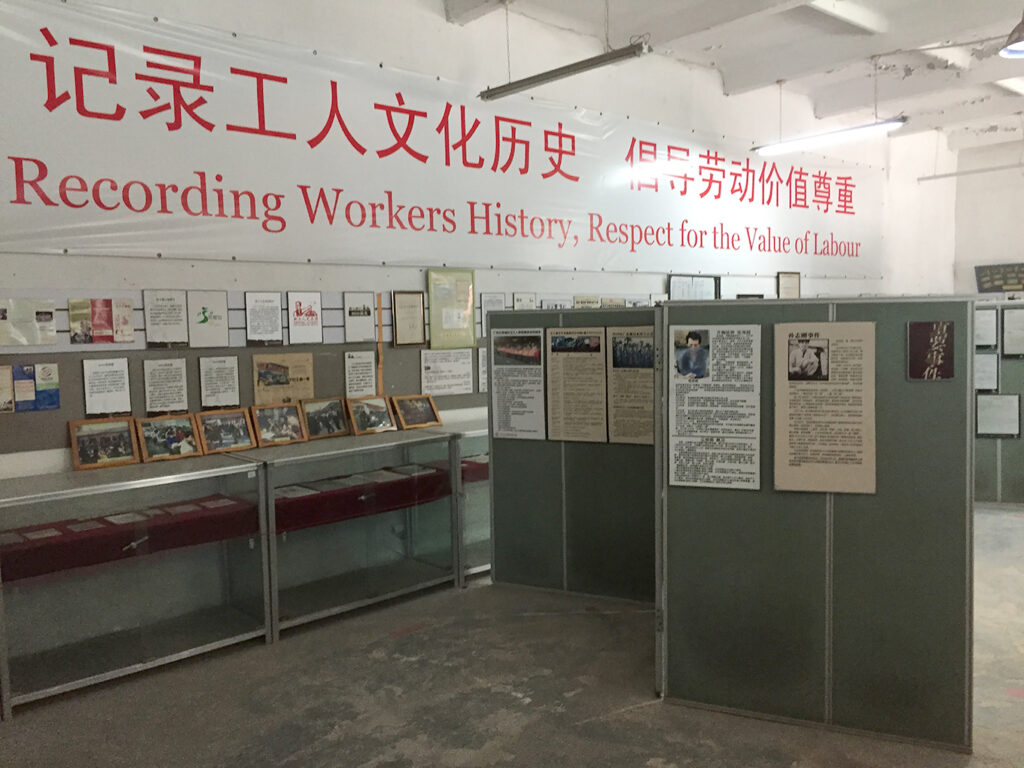
Zhou: I have a question about the Culture and Art Museum of Migrant Workers. I have been there before but there were not many visitors. What was the original goal of establishing the museum? How is it doing now? What is the local government’s attitude towards it? Do schools organize trips to visit?
Wang: The original goal of the Culture and Art Museum of Migrant Workers was to construct workers’ culture. I believe we need a “root”, a foundation. What is a “root” or foundation? Something symbolic like a museum is the most appropriate. The demographic dividend was critical during the forty years of the Reform and Opening Up. From peasants to workers, we made many contributions behind the scenes. We want to document this process as it is also an important part of our culture. This is the original goal of the museum. We also hope that workers can see themselves and others can learn about the real living situation of workers through the museum. After a while, children born into wealthy families would not be able to imagine the difficulties and hardships of the past. The museum is also an approach to increase people’s recognition of the group of migrant workers or at least reduce prejudice.
Zhou: Where did you collect exhibiting artifacts when preparing the museum?
Wang: Sun Heng was primarily responsible for it. I was not deeply involved with the preparation process since I was busy with the charity store. Most exhibiting artifacts are collected from ordinary people. There were also many active domestic NGOs, so we encouraged labor agencies around the country to work with us. We gave them a certificate if they made a donation. Additionally, we also recorded many worker friends’ typical stories to display in the museum. Of course, each exhibition hall has a different theme and timeline. Our stories are pretty detailed as we put great effort into it. I involved with the museum more later, mostly in maintenance and guided tours.
Zhou: After the museum was built, as far as financial resources for maintenance and dealing with the local government, have you ever been asked to make any changes?
Wang: Not directly. We are influential in this field both in China and abroad. We are covered by nearly all mainstream media in China.
Zhou: How did you finance the museum? Were you supported by the government?
Wang: The government supported us financially for a few years until Beijing started to remove non-capital functions. Under this circumstance, we received less support. In the beginning, we also reached out to variousfoundations to raise funds. Today, we are doing crowdfunding.
Zhou: What about the museum? Are there any collaborations with local government or schools, such as tours?
Wang: There are many tours, including foreign visitors. A Singaporean school comes every year. Schools in Beijing, such as the High School Affiliated with the Renmin University, the Affiliated High School of Peking University, and other international schools, middle schools, as well as elementary schools come here frequently too. These schools mainly want to make students understand another side of our society, a different kind of world.
Zhou: Have you ever thought about moving the museum outside of Picun and expanding its scale? Like Jianchuan Museum has a section about worker’s history [2]. They also built a branch in Chongqing to focus on worker’s history. The “worker” they refer to is different from the concept of “new workers” and is more traditional though.
Wang: Of course, we will think about expanding the scale if we have financial support. Jianchuan Museum mainly highlights the history of state-owned enterprises (state-run factories), while we can only tell our stories clearly.
Dong: All right, as we are near the end, I want to know more about your personal work. I know you have made many documentary films and performances. I am wondering why these art forms are attractive to you. I also want to know which works influenced you as I heard that you have a unique interpretation of Bicycle Thieves (Ladri di biciclette).
Wang: Actually, all our art and cultural works are about telling stories of workers, speaking up for workers, and even expressing our anger. Art and cultural works can be accepted by workers and outsiders more easily. They are sensory, tangible, concrete, and unlike texts or museums that only stay in one place. In particular, sketch comedy or crosstalk shows are acceptable to people of different social classes. But of course, some people may disagree with certain sensitive content.
Regarding documentary film, I was not really into this art form at the beginning, because other worker friends were not interested in it and found it a bit boring. However, we needed to observe and document the stories of workers from our perspective which is different from the mainstream media. Therefore, whether workers like it or not, we must save the material from our point of view. I know worker friends do not like documentary films, which are difficult to distribute among them, unlike our songs or gala performances. However, it does help us engage with the circle of intellectuals. You just mentioned the Bicycle Thieves. I was pretty curious when watching it. I knew the film used amateur actors. I am a filmmaker and work with amateur actors too since I cannot afford professional actors. Thus, I have a personal understanding of the mise-en-scène. Bicycle Thieves was made in the 1940s and is older than my father. But the workers’ situation at that time is very similar to today’s China, including the difficulties and bitterness of the working class and different living conditions. Even though it is a Western film, the commonality of humans or the subaltern still shocked me significantly. Although it was made years ago, the labor union worked better than the union in China today. These things influenced our works today. Another thing is that common is more relatable. The actor lost his job after performing in the film. It is really sad. The protagonist also has a young son. Te son’s innocence and sensibility highlights his powerlessness and desperation.
These things happen in our real lives too. For example, there was a worker friend in our community whose mobile phone was stolen. He stole other people’s phones as revenge. He was caught in a karaoke bar and beaten up by thugs. He tried to escape but could not. Thus, he jumped off the third or fourth-floor window. Fortunately, he did not die or get permanently disabled. But he was badly injured with multiple fractures. This is a true story that happened in our lives. I helped him to negotiate with the owner of the karaoke bar and protect his legal rights.
The director worked well with amateur actors. Many scenes were made in real locations instead of film studios or professional actors. There is a soccer game in the film, which is framed as an escape from reality for workers or an approach to distract workers’ attention. I agree with this interpretation. During the difficult time (when unemployment rate was high), many workers were obsessed with soccer, which reduced their sense of depression about their jobs and lives and thus they could still unite. Also, the labor union at that time did a good job and was effective. It stood with workers to deal with their difficulties collectively. These things make us think a lot and are meaningful to our work. In the film, workers stood on the sidewalk and waited for jobs. They fought for job opportunities since sometimes only five out of one hundred people would be hired. The situation is the same today. Despite the advancement of technology and improvement of living conditions, there is no substantial change.
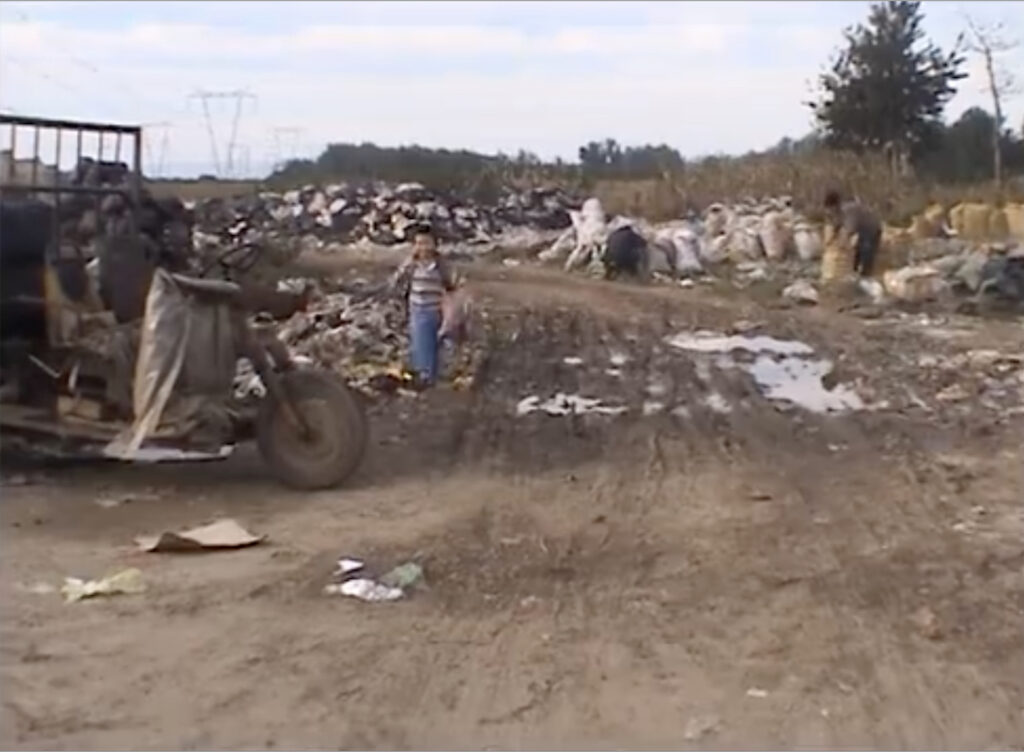
Dong: In your early and recent documentaries of New Workers’ Video Collective, there are discussions about the education of the second and third generation of migrant workers, such as Little Tiger (小虎) and After Us, the Deluge (野草集). Song Yi said that it was your idea to make films on this theme. Why do you want to focus on the issue of education, especially among the second and third generation of migrant workers? What are the key problems? As the Tongxin Experimental School turns into an off-campus study center today, are you looking for possible solutions to this problem?
Wang: Yes, we hoped to find solutions to the education of migrant workers’ children when we started the school at that time. It did help some students with their specific problems of schooling but did not make a big difference. Due to the problem of social class, the education of our children gets worse today. With the development of the society, these kids are supposed to have better education. But in the current environment, the education system is unfair. How can we reflect this unfairness? Documentation is our form of resistance. Against the background of highly developed capital, many of our children who cannot receive good education are trained into cheap labor for the capital. This is problematic, especially considering its effect on class solidification. Children might accept their fate at a young age. In third or fourth grades, they might still be very idealistic, dreaming of attending Tsinghua University or Peking University. However, in the fifth or sixth grade, they become very realistic and start working right after middle school. Their life experience growing up with unfair education shapes their understanding and ways of living. Our community of workers needs to make progress from generation to generation, including subjective consciousness, class consciousness, and beyond. It is thus necessary to ensure better education for the next generation. We all certainly hope that in the future we will not stay in this class. However, this is hard to change. Documentation is a way of expressing this.
We are also documenting a main contradiction within the group of the worker friends. On the one hand, there are left-behind children in the villages who lack family love, and on the other hand, migrant children in the city have no right to receive a good education. These are very realistic but have been covered by the society’s booming appearance. We still hope that these can be exposed to display the truth to everyone and make people realize that things are not completely beautiful. What we can do is limited. There are primary contradictions and secondary contradictions in practice. We first grasp the primary contradictions and do whatever we can do. But eventually, as adults, we feel guilty about our children because we have not done a good job.
Translation by Ningxin Chen, Sichuan Fine Arts Institute
Notes
[1] Zhang Huiyu (张慧瑜) is a professor at the School of Journalism and Communication at Peking University. Liu Chen (刘忱) is a professor in the Central Party School of the Communist Party of China (National Academy of Governance).
[2] The Jianchuan Museum Cluster is located in Anren Town, Dayi County, Sichuan, China, about one hour’s drive from the provincial capital Chengdu. It consists of 26 museums that showcase China’s largest private collection of artifacts amassed over the last 60-70 years. See https://www.jc-museum.cn/en/

